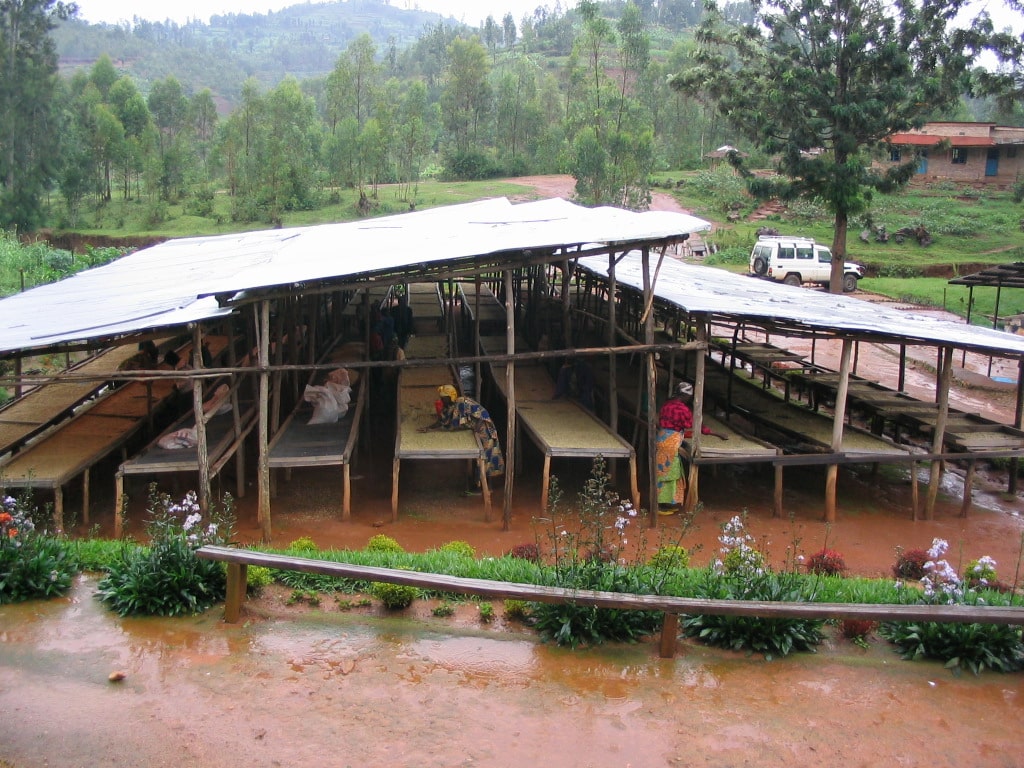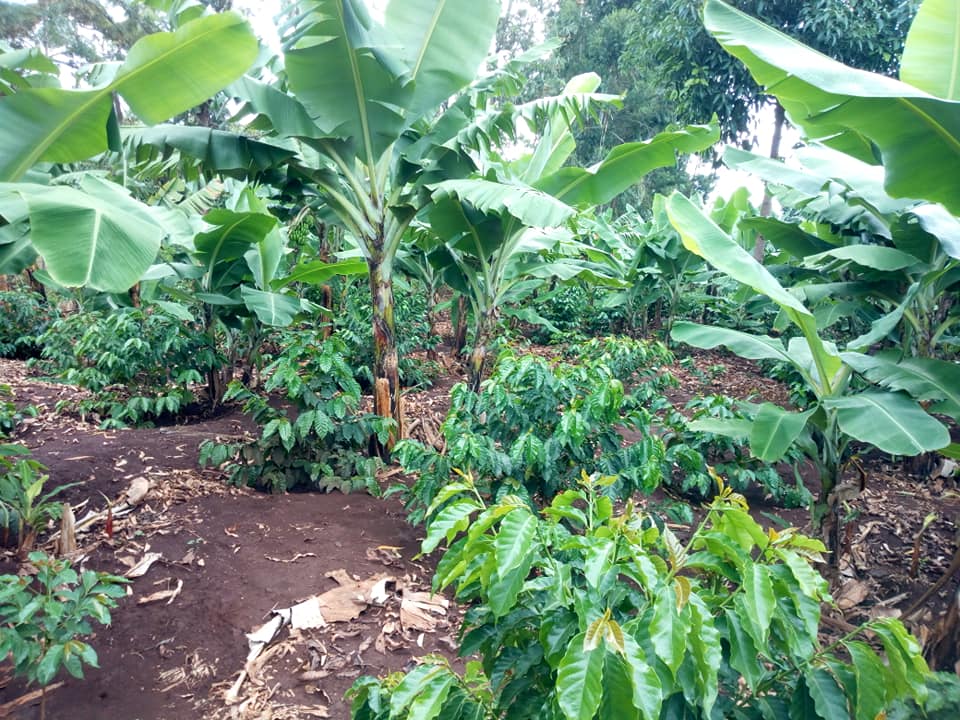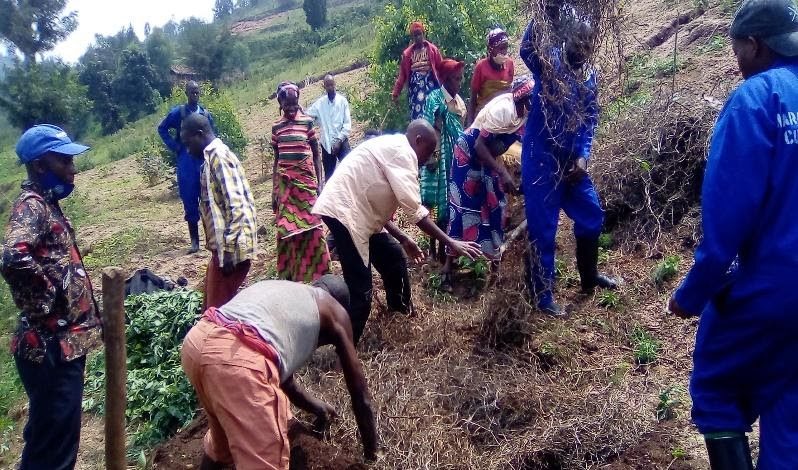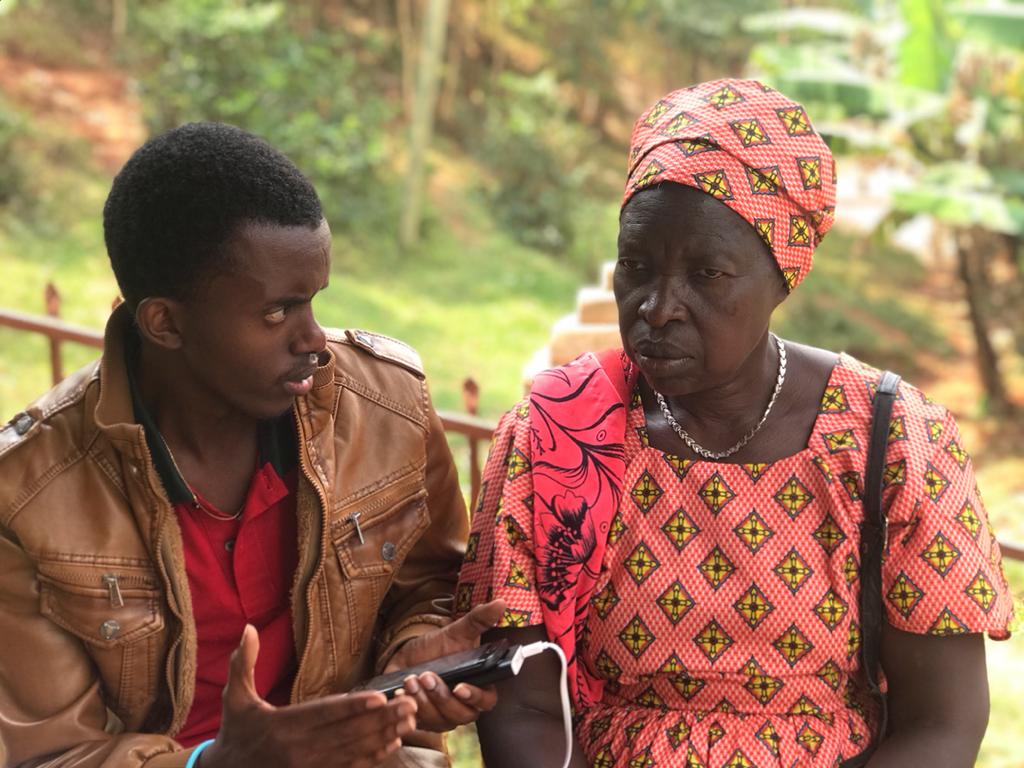
High in Rwanda’s southern mountains, farmers grow some of the highest-quality coffee on Earth. The volcanic soil gives beans a rich flavor that commands a premium price on the international market. But this specialty coffee is at risk-as are the livelihoods of the 400,000 smallholder farmers in the country who depend on it.
According to Jean Baptiste Munezero, the agronomic supervisor at Maraba coffee cooperative, “prolonged droughts and the emergence of new pests and diseases are depressing coffee production.” He describes how these events are impacting farmers: “Decreasing coffee production causes lower family income, made worse by insufficient food supply.” And the cause of these compounding challenges? Climate change.
 Farmers work at the Maraba coffee processing station during a downpour in the rainy season.
Farmers work at the Maraba coffee processing station during a downpour in the rainy season.
Coffee farmers in Rwanda plan their coffee farming based on the timing of annual dry and rainy seasons, but climate change has made once-predictable patterns erratic and extreme. Torrential floods wash away the nutrient-rich soil, while prolonged droughts prevent microorganism growth that’s needed to replenish it. Without nutrients or consistent water, coffee plants struggle to grow, producing fewer beans each year or dying altogether. Farmers turn to expensive synthetic fertilizers, which cut into their profits and may contaminate local ecosystems.
Root Capital’s advisory team works with Maraba to make farmers’ land work for them. That means practicing regenerative agriculture that doesn’t just improve yields in the short run, but replenishes soil for generations to come.
First, we partnered with Jean Baptiste and his team to conduct a diagnostic of the cooperative’s risks so we could identify practical steps to help the cooperative adapt. Through internships, in-person training, and remotely delivered agronomic advice, we’re building climate resilience for Maraba and its 2,200 farmers.
 Coffee trees being grown beneath banana shade trees on a coffee farm in Rwanda.
Coffee trees being grown beneath banana shade trees on a coffee farm in Rwanda.
Harnessing an age-old technology: trees
One of farmers’ best tools to guard against floods and protect their soil is also one of the oldest: trees. The deep roots of tall shade trees help to mitigate soil erosion, especially on the mountainous slopes where Maraba’s farmers grow their coffee. These trees also slow the maturation of the coffee bean, allowing it to develop more flavor. Shade-grown coffee actually earns a higher price on the international market.
Our advisors trained Jean Baptiste’s team on agroforestry-incorporating and conserving trees alongside agricultural crops. Maraba now distributes seedlings of fruit and other shade trees to farmer-members and provides training on how and where to plant them. These trees protect the long-term soil health of farms, help prevent run-off into surrounding ecosystems, and boost incomes for local farmers through higher yields and alternative sources of income.
 An intern shows members of Maraba how to mulch a farm during a training demonstration
An intern shows members of Maraba how to mulch a farm during a training demonstration
Dirty hands make happy plants: composting and mulching
Whether in a backyard garden or at an industrial scale, composting is a critical way to repurpose food and agricultural waste into affordable organic fertilizer. For years, Maraba provided members with compost derived from the pulp of the coffee cherry, discarded during processing. While Maraba had the infrastructure to produce and distribute compost, according to our initial climate diagnostic, farmers needed more training on how to apply it effectively on their farms.
Composting, like planting, is seasonal. If farmers apply compost too early, it risks washing away during the rainy season. Apply it too late and the coffee plant might not benefit from the nutrients it provides. Farmers also need to apply the right amount of compost to each plant, maximizing the benefit of this limited resource.
Farmers’ challenges were compounded by insufficient mulching-a practice by which a protective layer of organic material, such as dead grasses or pruned branches, is placed around the coffee plant to trap water and nutrients in the soil. This prevents nutrients from washing away and traps moisture in the soil to reduce the need for irrigation.
To build farmers’ knowledge of good composting and mulching practices, we sponsored three young agronomic interns through our Talent Partnerships program. Interns received weekly virtual training on climate-smart agriculture, and then helped Maraba’s technical assistance team share that knowledge with farmers in the field. Maraba has also started training farmers on how to compost on their own farms, increasing their self-reliance.
Through this type of on-farm training, Maraba has brought transformational agronomic information to many of its farmers. However, the immeasurable scope of climate change requires us to think of new ways to impact farmers at scale.

Training farmers at the touch of a button
Many areas of Rwanda remain fairly inaccessible, especially in the mountain passes where Maraba’s farmers operate. As a result, we found that the average agricultural extension worker in Rwanda is responsible for training 330 farmers, well above the recommendation of one extension worker for every 30-50 farmers.
However, the country’s mobile phone infrastructure is sophisticated, with nearly three-quarters of the population having access to a mobile phone. Taking advantage of this connectivity, we piloted a mobile agronomic message service with Maraba to extend the reach of the cooperatives’ agricultural training team. In partnership with Precision Agriculture for Development and with the support of the IKEA Foundation, we designed agronomic alerts timed to the patterns of the coffee farming season that were sent to farmers via SMS texts and pre-recorded voice messages.
These alerts refreshed farmers on agricultural practices, prompted them to implement specific practices at the right time, and cautioned about unusual weather conditions. These tools may seem simple, but they enable an enterprise to reach exponentially more farmers in remote areas with information that could boost yields and improve livelihoods.
A forthcoming evaluation of the service found that 63% of farmers that received the service increased their knowledge of good agricultural practices during the pilot. Additionally, farmers that reported using the message service had higher levels of coffee production.
“The project has helped improve the environment through enhanced agro-forestry… [and] improved agronomic knowledge for workers and farmers,” Jean Baptiste reflects. “The training has motivated farmers to expand their coffee production.”
To respond to the climate crisis, we need diverse, context-specific solutions that work for smallholder farmers. Thanks to the hard work of Jean Baptiste and the whole team at Maraba, we’re ensuring that coffee farmers in Rwanda have the tools they need to grow a greener future.

